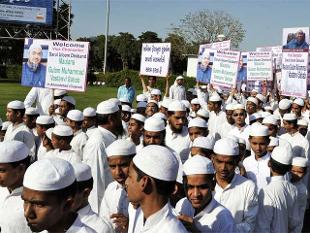 Mumbai, Jul 4: Amid outrage over Maharashtra government's decision to de-recognise madrasas which only educate students on Islam, the Shiv Sena today said the move should not be seen as one intended to strike a blow to religious education in the state.
Mumbai, Jul 4: Amid outrage over Maharashtra government's decision to de-recognise madrasas which only educate students on Islam, the Shiv Sena today said the move should not be seen as one intended to strike a blow to religious education in the state.
The Sena came down heavily on those opposing the state government's decision and said that protests are being held only due to fears that if Muslims start thinking independently, parties, whose existence lies on playing vote-bank politics will be in danger.
"The government has taken a decision to treat madrasas that do not teach subjects like English, Science and Mathematics as non-schools. This move should not be seen as one which is pre-conceived or which is intended to strike a blow to religious education. On the contrary, this should be taken as a way to get Muslim children in the mainstream," the Sena said in an edit in its mouthpiece 'Saamana.'
It further sought to know what is wrong in bringing children who are studying in madrasas to the mainstream and where is the question of spreading communalism with the initiative.
"Muslims have been caught between Islam, Islamic education and extremism. Thus, while the world is progressing with each passing day, Muslims are only stuck between ignorance and illiteracy," it said.
"If Muslims too start thinking independently, what will happen to the contractors of Islam and parties like the Congress that thrive on such vote bank politics? This is what is leading them to oppose the government's decision," it added.
The Sena said the government has made it clear that not only madrasas but even religious institutions of other faiths will be classified as non-schools and thus, the government's move should not be seen as a revenge against the Muslim community





Comments
Add new comment